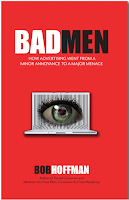I am still hopeful that we can save ourselves.
We are in very deep trouble, but there may be a strategy to rescue ourselves from the hole we have dug.
Let's start by defining the problem. The problem is that everyone seems to have lost confidence in us.
Our clients don't trust us. In fact, the Association of National Advertisers is conducting 2 investigations into our practices. Additionally, many clients are leaving and doing their advertising work in-house.
Consumers don't trust us. 200 million people worldwide are actively engaged in not allowing us to reach them.
Our most important human resource - talent - is fleeing at frightening velocity.
Why is all this happening? There are several reasons:
First, online advertising has turned us into liars. We pretend that we don't know about the astounding amount of fraud and irregularities. We pretend that the numbers we present to our clients are reliable. Constant lying -- either by commission or omission -- eats away at our fiber.
Next is the rancid quality of online advertising. The aesthetic lineage of online advertising is not "Madison Avenue," it is the maddening tackiness of
Third, we have become crime enablers. Very large and malignant crime networks are built on the skeleton of online advertising and marketing.
Perhaps most appalling of all, by our constant surveillance of consumers (we call it "tracking" but let's not shit ourselves) we are undermining personal privacy -- one of the principles that is foundational to a democracy.
The sad part of all this is that the problem is not actually advertising.
The problem resides in what we call "ad tech" -- the tracking and hounding of consumers and the warehousing and selling of information about consumers to third parties.
There is no reason why advertising cannot be successful online. There is no reason why people should hate online advertising as much as they do. There is no reason for us to be liars and crime enablers.
None of this is necessary. All other forms of advertising succeeded for decades without tracking and so can online advertising. It simply is not necessary. We just have to get rid of tracking and use the web like we use all other advertising media.
If tracking had proven to be exceptionally effective maybe we could justify it on an "end justifies the means" argument. But it has not. As I wrote recently...
So far this has been a spectacular failure. Each of us is currently inundated with dozens, if not hundreds, of online messages a day -- banner ads, emails, social messages, etc -- that are assumed by marketers to be particularly relevant to us and reflective of our individual purchasing needs and behaviors. We pay almost no attention to any of them.The big picture is this. Most people have no love for advertising. They are willing to tolerate it because of the free entertainment and information it provides them. But online advertising has crossed a line. It has dismantled an edifice of reasonable trust between us and the rest of the world.
There is no reason for us to continue to allow ad tech to pollute the soil of our business. If we get rid of it, we will be happier, consumers will be happier, and, in the fullness of time, our clients will be happier.
Facebook and Google may not be happier, but you know what? I'll worry about them some other time.





